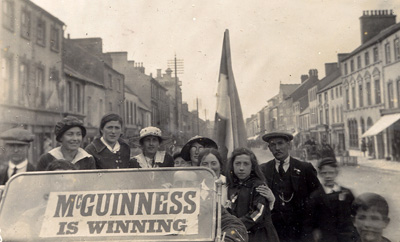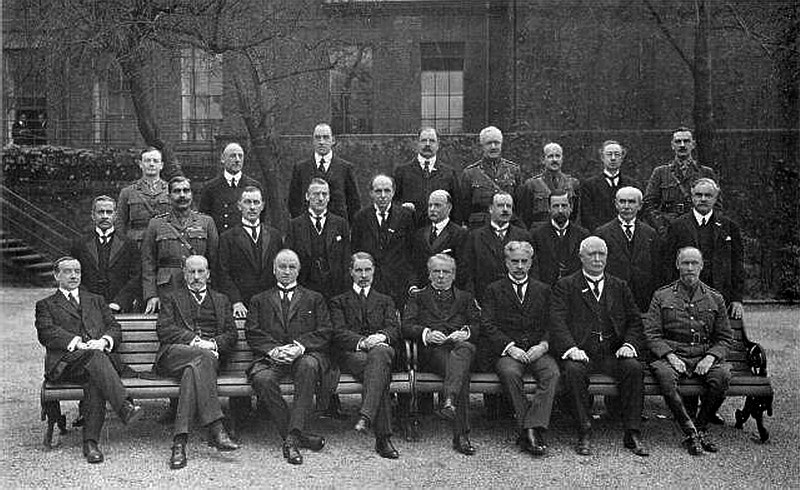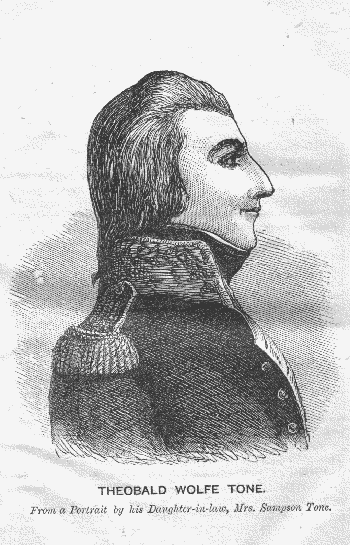|
Conscription In Ireland
Military conscription has never applied in Ireland (both Northern Ireland and Republic of Ireland). The Defence Forces are the armed forces of the Republic of Ireland, and serves as an all-volunteer military. Irish neutrality means Ireland has been neutral in international relations since the 1930s, though it has participated in several United Nations peacekeeping missions. Early history During the period of British rule, press gangs operated in Ireland as they did in Britain, conscripting men to serve in the Royal Navy. Impressment in Ireland began in the early modern era, with such activities peaking during major conflicts and then subsequently receding. In 1793, the Irish Militia was established by the Dublin Castle administration as a result of the outbreak of the French Revolutionary Wars to defend Ireland from invasion. Enlisted members of the Irish Militia were officially intended to be randomly chosen by local ballots, though widespread opposition to this led to the ... [...More Info...] [...Related Items...] OR: [Wikipedia] [Google] [Baidu] |
Conscription
Conscription, also known as the draft in the United States and Israel, is the practice in which the compulsory enlistment in a national service, mainly a military service, is enforced by law. Conscription dates back to antiquity and it continues in some countries to the present day under various names. The modern system of near-universal national conscription for young men dates to the French Revolution in the 1790s, where it became the basis of a very large and powerful military. Most European nations later copied the system in peacetime, so that men at a certain age would serve 1 to 8 years on active duty and then transfer to the reserve force. Conscription is controversial for a range of reasons, including conscientious objection to military engagements on religious or philosophical grounds; political objection, for example to service for a disliked government or unpopular war; sexism, in that historically men have been subject to the draft in the most cases; and ideol ... [...More Info...] [...Related Items...] OR: [Wikipedia] [Google] [Baidu] |
Ballot
A ballot is a device used to cast votes in an election and may be found as a piece of paper or a small ball used in voting. It was originally a small ball (see blackballing) used to record decisions made by voters in Italy around the 16th century. Each voter uses one ballot, and ballots are not shared. In the simplest elections, a ballot may be a scrap of paper on which each voter writes in the name of a candidate, but governmental elections use printed ballots to protect the secrecy of the votes. The voter casts their ballot in a box at a polling station. In British English, this is usually called a "ballot paper". The word ''ballot'' is used for an election process within an organization (such as a trade union "holding a ballot" of its members). Etymology The word ballot comes from Italian ''ballotta'', meaning a "small ball used in voting" or a "secret vote taken by ballots" in Venice, Italy. History In ancient Greece, citizens used pieces of broken pottery to scratch ... [...More Info...] [...Related Items...] OR: [Wikipedia] [Google] [Baidu] |
Irish Parliamentary Party
The Irish Parliamentary Party (IPP; commonly called the Irish Party or the Home Rule Party) was formed in 1874 by Isaac Butt, the leader of the Nationalist Party, replacing the Home Rule League, as official parliamentary party for Irish nationalist Members of Parliament (MPs) elected to the House of Commons at Westminster within the United Kingdom of Great Britain and Ireland up until 1918. Its central objectives were legislative independence for Ireland and land reform. Its constitutional movement was instrumental in laying the groundwork for Irish self-government through three Irish Home Rule bills. Origins The IPP evolved out of the Home Rule League which Isaac Butt founded after he defected from the Irish Conservative Party in 1873. The League sought to gain a limited form of freedom for Ireland within the United Kingdom of Great Britain and Ireland in order to manage Irish domestic affairs in the interest of the Protestant landlord class. It was inspired by the succ ... [...More Info...] [...Related Items...] OR: [Wikipedia] [Google] [Baidu] |
Sinn Féin
Sinn Féin ( ; ; ) is an Irish republican and democratic socialist political party active in both the Republic of Ireland and Northern Ireland. The History of Sinn Féin, original Sinn Féin organisation was founded in 1905 by Arthur Griffith. Its members founded the revolutionary Irish Republic and its parliament, the First Dáil, and many of them were active in the Irish War of Independence, during which the party was associated with the Irish Republican Army (1919–1922). The party split before the Irish Civil War and again in its aftermath, giving rise to the two traditionally dominant parties of Irish politics: Fianna Fáil, and Cumann na nGaedheal (which merged with smaller groups to form Fine Gael). For several decades the remaining Sinn Féin organisation was small and often without parliamentary representation. It continued its association with the Irish Republican Army (1922–1969), Irish Republican Army. Another split in 1970 at the start of the Troubles led to th ... [...More Info...] [...Related Items...] OR: [Wikipedia] [Google] [Baidu] |
Irish Nationalism
Irish nationalism is a nationalist political movement which, in its broadest sense, asserts that the people of Ireland should govern Ireland as a sovereign state. Since the mid-19th century, Irish nationalism has largely taken the form of cultural nationalism based on the principles of Self-determination, national self-determination and popular sovereignty.Sa'adah 2003, 17–20.Smith 1999, 30. Irish nationalists during the 18th, 19th, and 20th centuries such as the Society of United Irishmen, United Irishmen in the 1790s, Young Irelanders in the 1840s, the Fenian Brotherhood during the 1880s, Fianna Fáil in the 1920s, and Sinn Féin styled themselves in various ways after French left-wing Radicalism (historical)#France, radicalism and republicanism. Irish nationalism celebrates the culture of Ireland, especially the Irish language, literature, music, and sports. It grew more potent during the period in which all of Ireland was part of the United Kingdom of Great Britain and Ire ... [...More Info...] [...Related Items...] OR: [Wikipedia] [Google] [Baidu] |
World War I
World War I or the First World War (28 July 1914 – 11 November 1918), also known as the Great War, was a World war, global conflict between two coalitions: the Allies of World War I, Allies (or Entente) and the Central Powers. Fighting took place mainly in European theatre of World War I, Europe and the Middle Eastern theatre of World War I, Middle East, as well as in parts of African theatre of World War I, Africa and the Asian and Pacific theatre of World War I, Asia-Pacific, and in Europe was characterised by trench warfare; the widespread use of Artillery of World War I, artillery, machine guns, and Chemical weapons in World War I, chemical weapons (gas); and the introductions of Tanks in World War I, tanks and Aviation in World War I, aircraft. World War I was one of the List of wars by death toll, deadliest conflicts in history, resulting in an estimated World War I casualties, 10 million military dead and more than 20 million wounded, plus some 10 million civilian de ... [...More Info...] [...Related Items...] OR: [Wikipedia] [Google] [Baidu] |
Conscription In The United Kingdom
In the United Kingdom, military conscription has existed for two periods in modern times. The first was from 1916 to 1920, and the second from 1939 to 1960. The last conscription term ended in 1963 although many soldiers chose to continue in the service beyond 1963. It was legally designated as "Military Service" from 1916 to 1920, and as "National Service" from 1939 to 1960. However, between 1939 and 1948, it was often referred to as "War Service" in documents relating to National Insurance and pension provision. First World War Conscription during the First World War began when the British Parliament passed the Military Service Act in January 1916. The Act specified that single men aged 18 to 40 years old were liable to be called up for military service unless they were widowed with children, or were ministers of a religion. There was a system of tribunals to adjudicate upon claims for exemption on the grounds of performing civilian work of national importance, domestic ha ... [...More Info...] [...Related Items...] OR: [Wikipedia] [Google] [Baidu] |
Lloyd George Ministry
Liberal David Lloyd George formed a coalition government in the United Kingdom in December 1916, and was appointed Prime Minister of the United Kingdom by King George V. It replaced the earlier wartime coalition under H. H. Asquith, which had been held responsible for losses during the Great War. Those Liberals who continued to support Asquith served as the Official Opposition. The government continued in power after the end of the war in 1918, though Lloyd George was increasingly reliant on the Conservatives for support. After several scandals including allegations of the sale of honours, the Conservatives withdrew their support after a meeting at the Carlton Club in 1922, and Bonar Law formed a government. Cabinets War Cabinet, December 1916 – January 1919 * George Curzon, 1st Earl Curzon of Kedleston – Lord President of the Council and Leader of the House of Lords * Bonar Law – Chancellor of the Exchequer and Leader of the House of Commons * Arthur Henderson – Mi ... [...More Info...] [...Related Items...] OR: [Wikipedia] [Google] [Baidu] |
Conscription Crisis Of 1918
The Conscription Crisis of 1918 stemmed from a move by the British government to impose conscription (military draft) in Ireland in April 1918 during the First World War. Vigorous opposition was led by trade unions, Irish nationalist parties and Roman Catholic bishops and priests. A conscription law was passed but was never put in effect; no one in Ireland was drafted into the British Army. The proposal and backlash galvanised support for political parties which advocated Irish separatism and influenced events in the lead-up to the Irish War of Independence. Background In early 1918, the British Army was dangerously short of troops for the Western Front. In the German Spring Offensive of 1918, German troops broke through the Allied lines in several sectors of the front in France, with a local advantage in numbers of four to one, putting severe strain on the Allied armies. The British Army, in one day, suffered a major setback, with the Imperial German Army over-running ... [...More Info...] [...Related Items...] OR: [Wikipedia] [Google] [Baidu] |
Provisional Irish Republican Army
The Provisional Irish Republican Army (Provisional IRA), officially known as the Irish Republican Army (IRA; ) and informally known as the Provos, was an Irish republican paramilitary force that sought to end British rule in Northern Ireland, facilitate Irish reunification and bring about an independent republic encompassing all of Ireland. It was the most active republican paramilitary group during the Troubles. It argued that the all-island Irish Republic continued to exist, and it saw itself as that state's army, the sole legitimate successor to the original IRA from the Irish War of Independence. It was List of designated terrorist groups, designated a terrorist organisation in the United Kingdom and an unlawful organisation in the Republic of Ireland, both of whose authority it rejected. The Provisional IRA emerged in December 1969, due to a split within Irish Republican Army (1922–1969), the previous incarnation of the IRA and the broader Irish republican movement. It ... [...More Info...] [...Related Items...] OR: [Wikipedia] [Google] [Baidu] |
Irish Republicanism
Irish republicanism () is the political movement for an Irish Republic, Irish republic, void of any British rule in Ireland, British rule. Throughout its centuries of existence, it has encompassed various tactics and identities, simultaneously elective and militant and has been both widely supported and iconoclastic. The Modern era, modern emergence of nationalism, democracy, and Classical radicalism, radicalism provided a basis for the movement, with groups forming across the island in hopes of independence. Parliamentary defeats provoked uprisings and armed campaigns, quashed by British forces. The Easter Rising, an attempted coup that took place in the midst of the First World War, provided popular support for the movement. An Irish republic was declared in 1916 and officialized following the Irish War of Independence. The Irish Civil War, beginning in 1922 and spurred by the Partition of Ireland, partition of the island, then occurred. Republican action, including armed cam ... [...More Info...] [...Related Items...] OR: [Wikipedia] [Google] [Baidu] |
Volunteer (Irish Republican)
A volunteer is a member of various Irish republican paramilitary organisations. Among these have been the various forms of the Irish Republican Army (IRA), the Irish National Liberation Army (INLA), and the Irish People's Liberation Organization (IPLO). ' is the equivalent title in the Irish language. Background The Irish Volunteers were formed in 1913, in reaction to the formation of the Ulster Volunteer Force earlier that year, to protect the interests of Irish nationalists during the Home Rule Crisis. The Volunteers took part in the 1916 Easter Rising and—as the Irish Republican Army (IRA)—in the Irish War of Independence. The title "Volunteer" or "Vol." was used for members of the Volunteers who were involved in the 1916 Rising, and in the War of Independence. A number of witness statements given to the Bureau of Military History make frequent use of "Volunteer" as a title for members of the Volunteers and IRA during that period. The County Antrim Memorial in Milltown ... [...More Info...] [...Related Items...] OR: [Wikipedia] [Google] [Baidu] |







